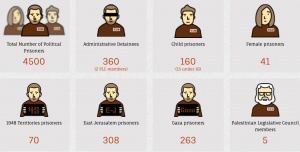On 5 August 2020, Addameer Prisoner Support and Human Rights Association (Addameer), Al-Haq, and Cairo Institute for Human Rights Studies (CIHRS) sent a joint urgent appeal to the United Nations (UN) Special Procedures, reasserting the need for an urgent intervention to uphold the right to health and safety of Palestinian prisoners in Israeli detention centres. Our organisations stress that Israel continues to fail to adhere to its legal obligations, as Occupying Power, and fails to protect Palestinian prisoners and detainees from the novel coronavirus (COVID-19), including the most vulnerable groups such as minors or chronically ill, and those held under administrative detention, in contravention of the international law.
Consequent to the initial urgent appeal, which was sent to five Special Procedure mandates on 1 April 2020, Al-Haq and partner organisations addressed again four Special Procedure mandates, including the UN Special Rapporteur on the situation of human rights in the occupied Palestinian territory, and explained how Israel’s systematic and long-established policy of medical negligence in Israeli detention centres has been aggravated by the recent Israeli practices and decisions.
Namely, Israel’s discriminatory practices against Palestinian prisoners and detainees, who are facing high-risk exposure to COVID-19, alarmed a group of UN human rights experts.[1] On 24 April 2020, the experts urged Israel to cease its discriminatory policies, referring to its decision to release Israeli prisoners as preventative and protective step amid pandemic,[2] as they further urged Israel to release the most vulnerable Palestinian prisoners and detainees, particularly women, children, older persons and those with pre-existing medical conditions, as a way to reduce overcrowding and ensure the minimum conditions to prevent the spread of the virus.[3] Lastly, owing to Israel’s decision to halt family visits for Palestinian prisoners and detainees and to restrict their access to lawyers since early March 2020, the experts noted that it “is critical that any such measures are medically justified and, if so, alternative means for communication, such as video conferencing, should be made available. Additionally, special and more relaxed measures should apply to children and women for the family visits.”[4]
Acknowledging that lawyer’s and family visits resumed in June 2020, our organisations highlighted in the urgent appeal further restrictions that were imposed, including the cancellation of family visits a night before the visit, or in the morning of the visit day. Similarly, the Israeli occupying authorities repeatedly delayed the scheduled lawyers’ visits and limited the number of the visited detainees as well as duration of the visits. Israel has further failed to take the necessary protective and preventative measures that are needed to ensure the health of the Palestinian detainees while transferring them to the courts and clinics. Moreover, whilst conducting daily searches and daily counts of prisoners five times a day, Israeli Prison Service (IPS) officers have not taken enough precautions such as wearing hazmat suits, protective gloves, or medical face masks as required.
Furthermore, Israel continues to conduct arbitrary arrests against Palestinians, during the spread of the pandemic, as it also imposes additional hardships on the newly detained, including being quarantine in overcrowded spaces. Detainees reported that they have been rarely given clean clothing and are allocated only one cup of alcohol per week to clean their cells. As such, by sustaining such degrading conditions in detention centres, Israel fails to uphold the prisoners’ right to health or prevent the spread of COVID-19, amounting to inhumane treatment.
In light of the above, three organisations urged the mandates to intervene in order to guarantee the rights to life and health, and safety of Palestinian prisoners during the COVID-19 pandemic, and to:
- Call on Israel, the Occupying Power, to release all Palestinian political prisoners from Israeli prisons and to ensure their safety from an uncontrolled spread of the pandemic, particularly those who are more vulnerable and more susceptible to the disease, including children, female prisoners, older persons, prisoners with underlying health conditions, and the injured;
- Demand, in particular, the release of all Palestinian political prisoners under Israeli administrative detention, who are detained indefinitely without charge or trial in contravention of international law, and urge the release of all Palestinian political prisoners who are nearing the end of their sentences and/or should be released on probation, to reduce overcrowding in prisons;
- Call on IPS to ensure the protection of all prisoners without discrimination by adopting the WHO’s recent guidance on preventing a COVID-19 outbreak in prisons, and taking necessary measures to prevent the spread of the pandemic in Israeli prisons;
- Call on Israel to implement adequate procedures to ensure the realization of the right to life, ensuring that prisoner deaths are promptly investigated and any violations prosecuted under law, accordingly.
[1] OHCHR, “COVID-19: Israel Must Release Palestinian Prisoners in Vulnerable Situation, say UN experts,” 24 April 2020, available at: https://www.ohchr.org/EN/NewsEvents/Pages/DisplayNews.aspx?NewsID=25822&LangID=E.
[2] The Jerusalem Post, “Israel releases 230 prisoners early to reduce crowding amid COVID-19 fears,” 29 March 2020, available at: https://www.jpost.com/breaking-news/israel-releases-230-prisoners-early-to-reducecrowding-amid-covid-19-fears-622844.
[3] OHCHR, “COVID-19: Israel Must Release Palestinian Prisoners in Vulnerable Situation, say UN experts,” 24 April 2020, available at: https://www.ohchr.org/EN/NewsEvents/Pages/DisplayNews.aspx?NewsID=25822&LangID=E.
[4] Ibid.


